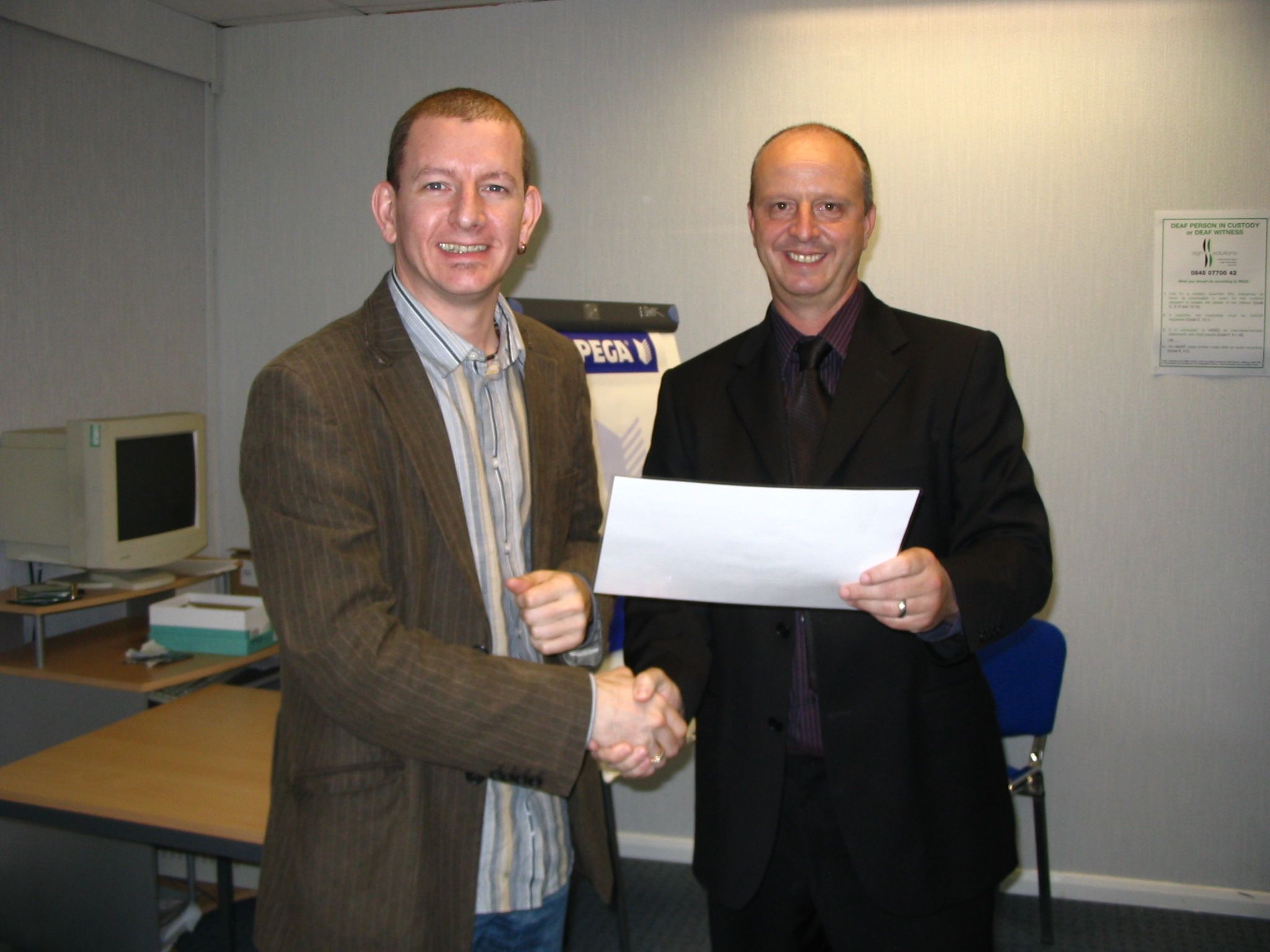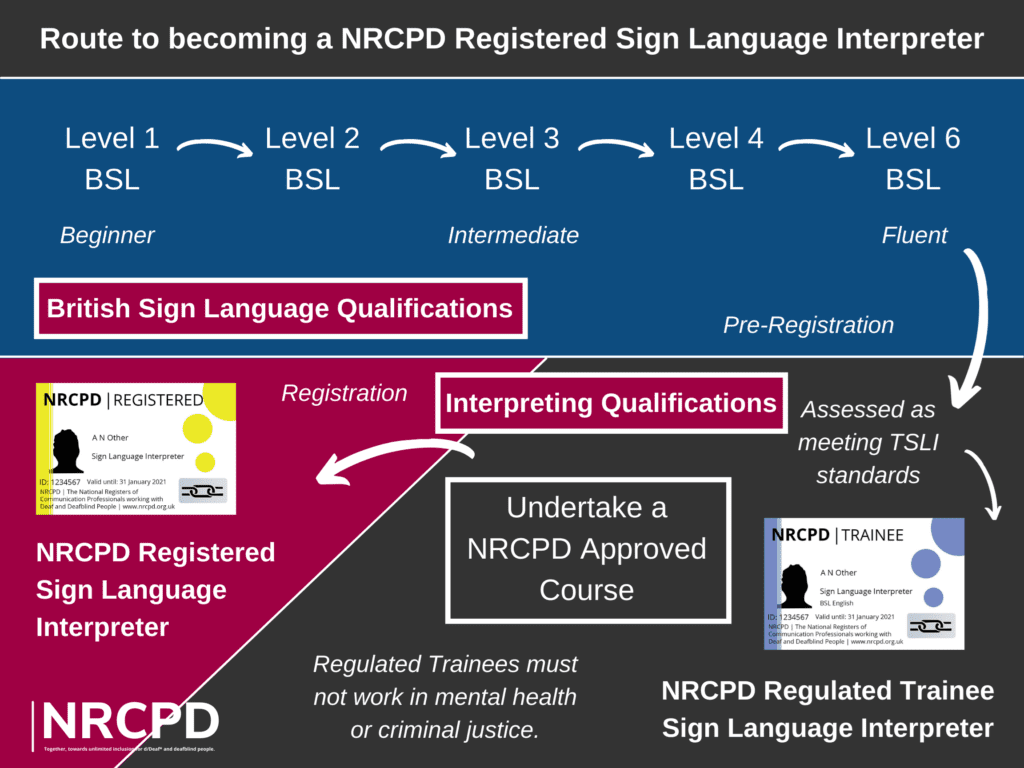What does a BSL Interpreter do?
A BSL/English Interpreter is someone bilingually trained, skilled and qualified who can translate quickly and efficiently between spoken English and British Sign Language (BSL). They will work in a variety of situations (medical, legal, meetings, workplace, conferences etc) to ensure that all parties communicate effectively with each other.
How to Work with a BSL/English Interpreter
Depending on the level of qualification of the interpreter they may be suitable for different types of work.
British Sign Language is the preferred and first language of many Deaf people. It is a language in its own right with it’s own structure, grammatical and linguistic rules.
In 2003 the British Government officially recognised British Sign Language as a language.
According to the Department of Work and Pensions there are about 70,000 British Sign Language users in Britain, although it is estimated that approximately 250,000 use BSL regularly as part of everyday life.Conventionally the use of the word ‘deaf’ (with a lowercase‘d’) refers to any person with a significant hearing loss, whereas ‘Deaf’ (with a capital ‘D’) refers to a person whose preferred language is BSL.
There is a broad duty under the Equality Act 2010 to consider the provision of BSL/English Interpreters in providing goods and services to Deaf sign language users.
Booking a Registered Interpreter
Signature administers the Register of BSL/English Interpreters through the National Registers of Communication Professionals Working with Deaf and Deafblind people (NRCPD). They also produces an on-line directory of their Registered Interpreters. When you book a freelance Interpreter, it is important to check that they are registered as this brings a guarantee of professionalism and confirms that a set of standards are in place.
There is a national shortage of BSL/English Interpreters, which means that they are likely to be booked up well in advance. Book early.
You should give as much information as possible when you make a booking with an Interpreter.
What you need to know before contacting the agency/interpreter:
- Date and time of the event including start and finish times.
- Full address of where the event is to take place including directions/map.
- Contact name and telephone number of the person making the booking and the event venue.
- The nature of the event.
- How many people are going to be involved in the event, including the numbers of Deaf and hearing people who will be present and the requirements that they have. This may mean that more than one interpreter needs to be booked
- Any other information that will help e.g. if a person has a visual impairment.
What you need to give the interpreter
- Relevant paperwork that will be used or referred to during the event
- The name of the person in charge of the event on arrival.
- Details of co-workers (interpreters) if any.
- Any other information that is relevant to the event.
- Agendas, minutes and other papers are useful in advance. This information will assist the interpreter to be prepared for the event itself. If you give the interpreter papers at the start of the meeting, allow sufficient time so that they can read them.
If the event will last longer than two hours and depending on the complexity, you may need to book two or more interpreters. This will also depend on the nature of the assignment e.g. where you might want back-up / multi-workshop event etc.
Interpreters know what information they are likely to need, so please give the opportunity to discuss the assignment in advance if requested. It is also helpful for interpreters to have time to discuss any issues on arrival so please allow for this.
There are a number of things that will enable the BSL/English Interpreter to provide an effective service:
- Environment needs to be conducive to good communication so consider lighting, sound and location.
- Turn taking – try not to talk over each other.
- The event should try to take account of the natural time lag in translating information, giving opportunity for the Deaf person to respond accordingly.
- Breaks.
Effective communication requires that the sign language user and interpreter are able to see each other clearly and that those relying on spoken English are able to hear the interpreter clearly. Good practice means that one person speaks at a time. It is impossible to interpret two people at the same time.
There will be a short time delay when a BSL/English Interpreter is working from BSL to English because the interpreter needs time to comprehend and reproduce in spoken English what is signed in British Sign Language and vice versa. This is especially important during questions or discussions to ensure that nobody is excluded. This process is taxing and it is important to ensure breaks are scheduled.

What is a Deaf Relay Interpreter?
A Deaf Relay Interpreter is an intermediary for Deaf people and they work alongside BSL Interpreters. They provide a specialist interpreting services assisting Deaf people communicate if they are not fluent in BSL or have issues that affects their ability to communicate.
This service is offered at Deaf Solutions 3, if you would like to know more please contact us.
